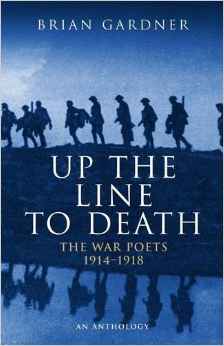The Great War, “The War to End All Wars, ” started 100 years ago this coming August. For many of the English-speaking generations since then, few things have shaped our idea of World War I than a group of British writers collectively known as the “War Poets.”
The more familiar members of this group, many of whom died in battle or from disease, were poets like Rupert Brooke, Wilfred Owen, and perhaps Isaac Rosenberg, who were most typically represented in our high school and college textbooks. They fought and died on the western front, mostly in Flanders and northeastern France.
But there were other fronts—Turkey, Iraq, Germany, East Africa—and other poets, some of whose names are still quite well known: Rudyard Kipling, Robert Graves, e.e. cummings, Herbert Asquith (son of the prime minister), Thomas Hardy, Seigfried Sassoon, Robert Service, A.P. Herbert, A.E. Housman, William Butler Yeats, and even A.A. Milne.
Fifty years ago, author Brian Gardner assembled an anthology of poems by the War Poets to commemorate the Great War (overshadowed as it had been by World War II). Entitled Up the Line of Death: The War Poets 1914-1918, it included poems by 72 poets, 21 of whom had died in the war.
The collection was, and remains, a broad one, covering not only life at the front but also war on the different fronts, life at home during wartime, and the sorrow of a devastated parent like Rudyard Kipling, whose only son was killed in action. (Kipling, so often associated with British Imperialism, developed into a harsh critic of the war and the British government.) It’s been reprinted several times since 1964, especially to update the short biographies of each poet in the appendix. My paperback edition was published in 2007; I discovered it in Blackwell’s Book Shop on Charing Cross Road in London last September.
The poems address the war in all its facets: the initial euphoric surge of patriotism; the reality of battle; the alternating tedium and horror that was trench warfare (including the lice); the unnecessary slaughter caused by incompetent generals; life in POW camps, recovery in convalescent homes for the wounded; how families back home dealt with wartime and the loss of sons; and the eventual armistice, greeted less with joy and more with an exhausted relief.

His wet white face and miserable eyes
Brought nurses to him more than groans and sighs:
But hoarse and low and rapid rose and fell
His troubled voice; he did the business well.
The ward grew dark; but he was still complaining
And calling out for ‘Dickie’. ‘Curse the Wood!
It’s time to go. O Christ, and what’s the good?
We’ll never take it, and it’s always raining.’
I wondered where he’d been; then heard him shout,
‘They snipe like hell! O Dickie, don’t go out’…
I fell asleep…Next morning he was dead;
And some Slight Wound lay smiling on the bed.
The collection includes familiar poems, like Wilfred Owen’s “Anthem for Doomed Youth” and Rupert Brooke’s “The Dead, ” and poets and poems almost forgotten, including C.H. Sorley, considered among the finest poets of his time. Their poetry, and the war it told the story of, had an enormous influence, including on the reluctance to engage Adolf Hitler until it was almost too late.
And yet, this is no volume dedicated to anti-war sentiments. Even among the most embittered, an understanding exists that some things have to be defended, have to be fought for. It is that understanding that makes the poems all the more poignant.
Image by Jenny Downing. Sourced via Flickr. Post by Glynn Young, author of the novels Dancing Priest and A Light Shining, and the just-published Poetry at Work (T. S. Poetry Press).
__________________
Want to brighten your morning coffee?
Subscribe to Every Day Poems and find some beauty in your inbox.
- Poets and Poems: Alison Blevins and “Where Will We Live if the House Burns Down?” - July 1, 2025
- Poets and Poems: Paul Pastor and “The Locust Years” - June 26, 2025
- What Happened to the Fireside Poets? - June 24, 2025

Maureen Doallas says
There are many activities this year in remembrance of WWI and a digital archive of First World War Poetry that comprises thousands of items of text, audio, images, video and more. For those who are interested in the poets, it’s a great resource. http://www.oucs.ox.ac.uk/ww1lit/